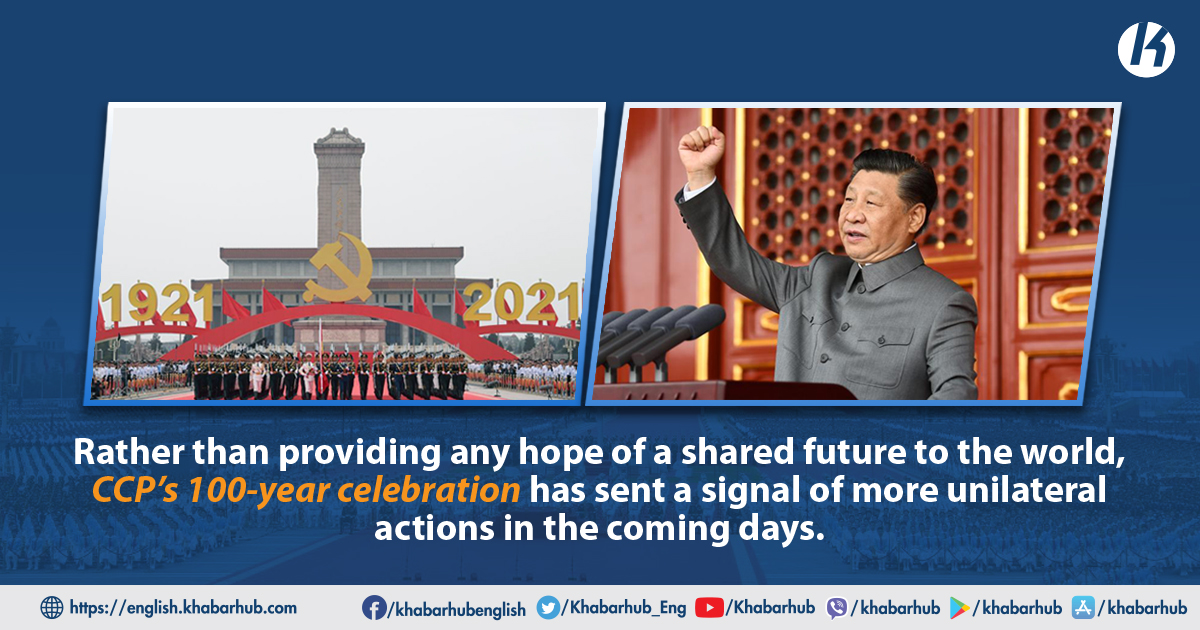Chinese Communist Party (CCP) celebrated its 100th founding anniversary on July 1 (Thursday). The centenary was a grand affair that featured a mass rally with flag-waving and patriotic songs being played.
During his address to the formal centenary event at Tiananmen Square Thursday, CCP’s General Secretary Xi Jinping warned foreign forces that it would “crack their heads and spill blood” if they tried to prevent China’s rise, in what can be termed as an ever-growing bellicose tone of the Chinese leader.
He has been playing up cards of fear and threat of foreign interventions to further consolidate his power and rule at home.
Xi’s North Korean style (attended by an unmasked 70,000 audience with crowded applause and cheers in his speech) public threats is sure to provoke Washington’s more hawkish policy toward China.
If Xi’s speech is to be analyzed, CCP’s 100-year celebration will not provide any hope of a shared future of the world but definitely signals more unilateral actions in the coming days.
The international community is irritated with China due to its engagement in a diverse campaign of malign activities that have undermined the rule-based well-established world order. The CCP has been a persistent threat to the open and democratic society all over the world.
Under the leadership of General Secretary Xi Jinping, CCP has been heading toward overconcentration of power on a single individual, changing the rule of static terms of office/term limits by eliminating internal potential rivals within the CCP, erasing new leadership succession within the party, systematically demolishing free space for intellectuals and journalists, militarization, and seeking domination over global affairs arbitrarily.
The CCP, meanwhile, is modernizing its military in a bid to dominate global affairs by 2049.
General Secretary Xi has astonishingly over-concentrated the personal power in CCP, which is fundamentally different than Deng Xiaoping’s open-up policy with decentralization of the power after Mao rule (from 1949- 1976).
It was founded following a 13 Chinese delegates’ secret gathering in the French Concession in Shanghai on July 1, 1921.
The CCP has undoubtedly risen from a tiny and fragile organization to the most powerful organization on the planet with up to 91.91 million members.
Current CCP leadership does not want to review its past commitment, however; heading into its own core interests and ambition.
President Richard Nixon’s 1972 visit to China fundamentally changed the American rapprochement with China. American harmonious relations have helped Beijing with foreign investment, economic advancement and modernization, progress and prosperous society from the fundamentalist poor communism rule.
CCP has gained the current status as an outcome of fundamental policy change that leads a poor country to the unthinkable achievement or miracle of economic growth.
Nepal can be neither fearful nor grateful towards CCP’s legacy but needs to be aware of the mindset of its ambition and manipulations.
CCP captured state power on October 1, 1949, and proclaimed the People’s Republic following a long and bloody civil war. Following CCP Chairman Mao’s declaration of Cultural Revolution (1966-1976) and Great Leap Forward (1958-1962) led to manmade catastrophe, famine, eliminate potential rivals and communist leaders, internal upheaval, humiliation by its political and policy failures, disastrous consequences of people and the national economy.
Of late, the Chinese leader’s ambitions, fundamental behavior, and party principles have changed the rule of international engagement.
Issues of grave concern over China have been increasingly becoming hostile in terms of its foreign policy (wolf warrior diplomacy), indiscriminate domestic repression, currency manipulation, coercive intentions, escalating propaganda, unilateralism, malign foreign influence, continued attempt to erase rule-based international order, explicit desire, and its complicated behavior with neighboring countries.
Meanwhile, its unfair economic practices such as theft of intellectual property/trade secrets, concealing its missteps, manipulation of public opinion in democratic countries, manipulation of technologies for their internal purpose, export their ideologies, and other issues have gone beyond the limit.
The CCP has brazenly violated all well-settled norms of global engagement. Moreover, China’s hegemonic intentions, ambition, and behavior will be even more complicated than the world order in the near future.
China’s unprecedented exercise of fast-paced and wrong directions to make future global hegemon could lead to a confrontational approach by the international community.
Countries around the world certainly need to unite to address China’s ongoing threats and challenges. However, this can only be done on the basis of multilateral security cooperation. To date, China is one of the beneficiaries of the current world order and security.
China’s commitments, agreements & assurances are far more different in terms of practical implementation and actions in the international arena.
The international community is irritated with China due to its engagement in a diverse campaign of malign activities that have undermined the rule-based well-established world order. The CCP has been a persistent threat to the open and democratic society all over the world.
On the occasion of the 100-year anniversary of its founding, CCP seems to have engaged in virtual conversation & conferences with Nepal’s all sections of society.
People here need to be concerned about China’s international and regional strategies, Chinese leadership’s scope & ambition, diplomatic common destiny, its relationship with other neighboring countries, nature of our geography, our history, culture, interdependency with other counties, economic and grant opportunities.
The conferences held almost every day have focused on glorifying the CCP, its General Secretary Xi Jinping, Chinese narratives of world order, China’s unilateral initiatives including the Belt and Road Initiative (BRI), exposing its achievements, etc., as part of its efforts to expand its influence in Nepal.
As a neighboring country, Nepali people should keep in mind the Chinese role and its attempt to impose its ideology and system through political parties in Nepal since the last election. Nepal’s appropriate dealing with CCP is crucial to resolve the critical national issues in the era of power competition.
Nepal can be neither fearful nor grateful towards CCP’s legacy but needs to be aware of the mindset of its ambition and manipulations.
People here need to be concerned about China’s international and regional strategies, Chinese leadership’s scope & ambition, diplomatic common destiny, its relationship with other neighboring countries, nature of our geography, our history, culture, interdependency with other counties, economic and grant opportunities.
As a democratic country, Nepal is naturally an ally of the collective and rules-based international system, which is in the best interests of the nation and ideological as well as a moral principle.








Comment